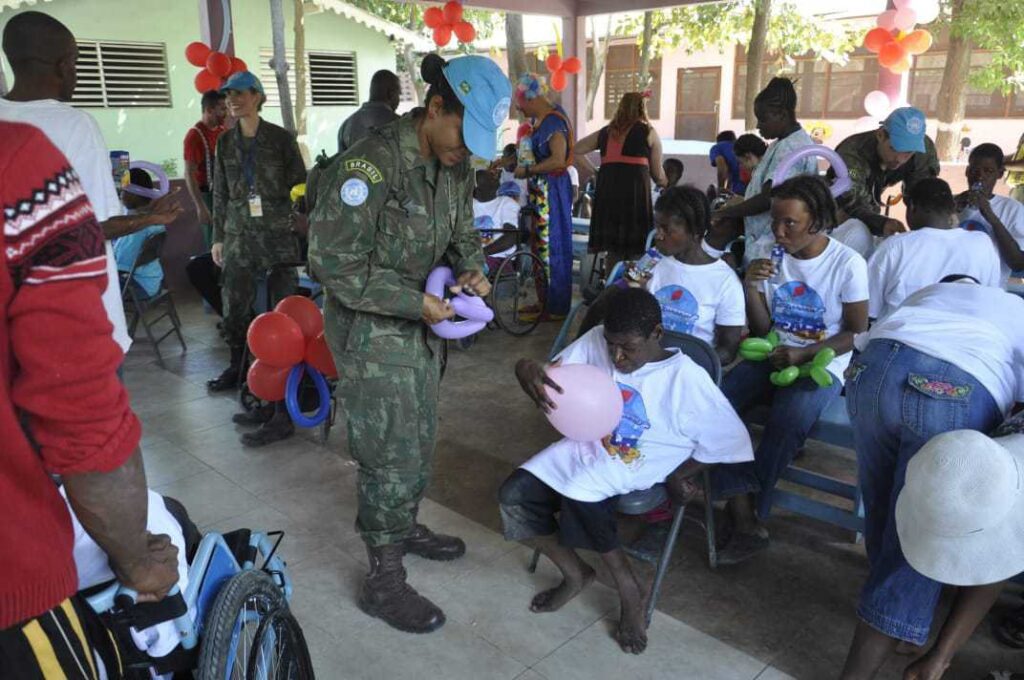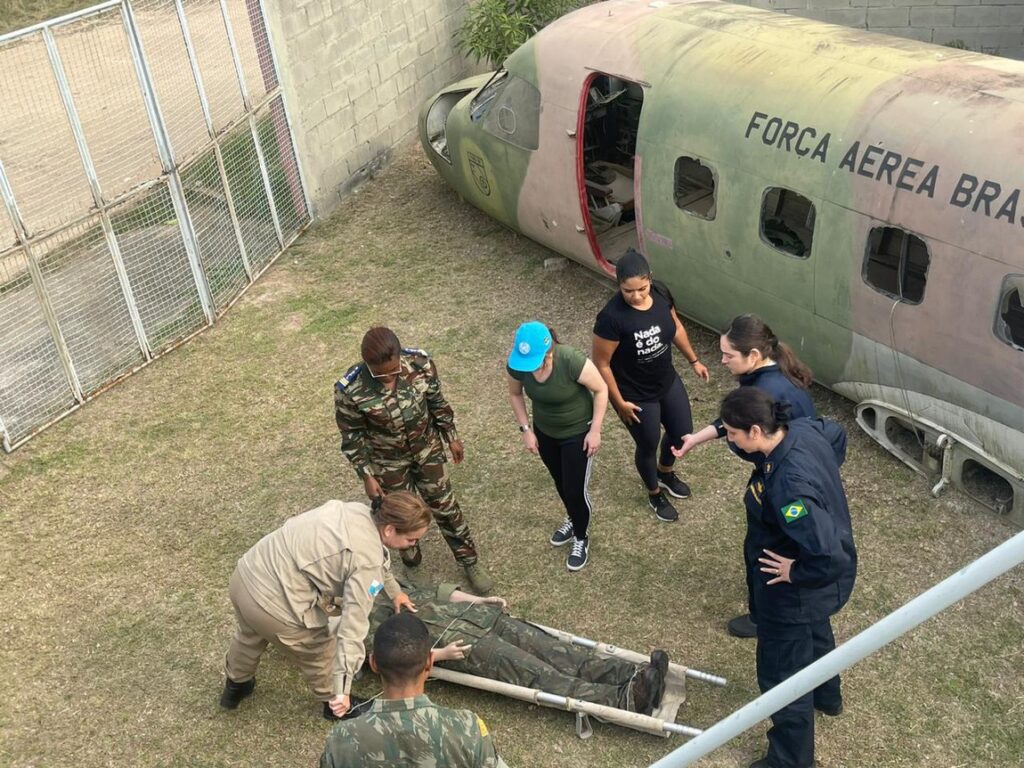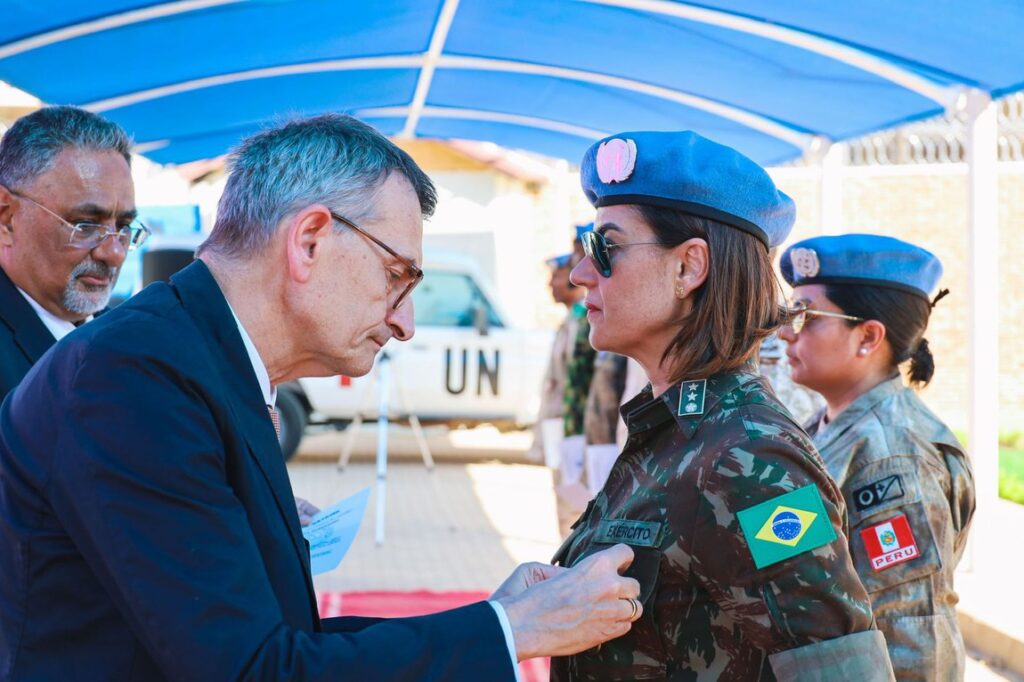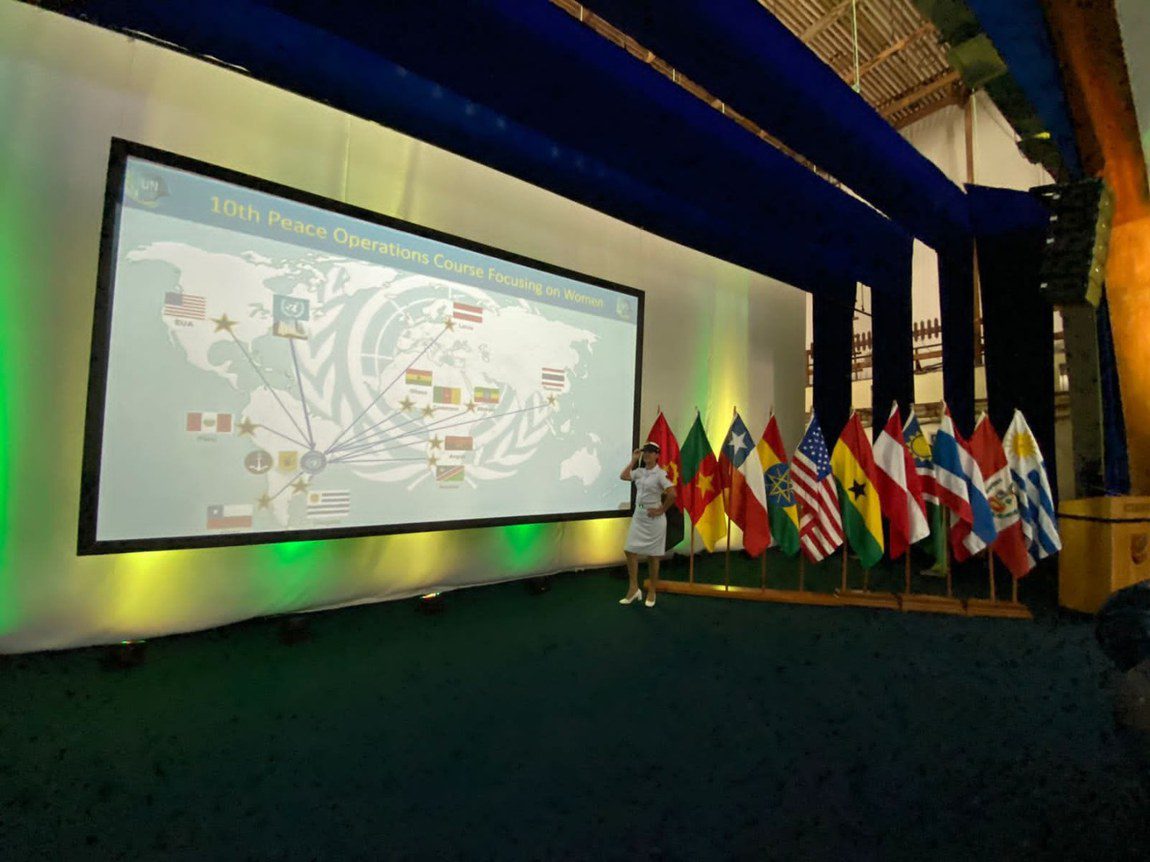By Carolina Militão (Ministry of Defense)
To promote knowledge and increasingly engage female participation in United Nations (UN) peace missions, the Center for Peace Operations of a Naval Character (COpPazNav), of the Brazilian Navy, promoted the 10th Peace Operations Course for Women in the international arena. In all, 59 women, among civilian and military, Brazilians and foreigners, participated in this training course, which ended last Friday (30).
According to the representative of the UN Secretary-General, Silvia Rucks, Resident Coordinator of the United Nations in Brazil, the presence of women in the Armed Forces is essential for the consolidation of peace. “The effective participation of women in UN peacekeeping missions is essential for conflict prevention and peace consolidation. Women have specific skills and abilities that promote human rights, protection of civilians, and greater access to communities, all of which contribute significantly to peace and security. Therefore, efforts must be intensified to ensure greater participation and representation of women in missions and peace processes around the world,” she said.
The internship, taught in English, was divided in two stages, the first one being distance learning, from June 14 to 21, with the approach of all the content of the Core Pre-Deployment Training Materials (CPTM). The second stage, from June 26 to 30, was in person, with lectures and practical activities at the Centro de Instrução Almirante Sylvio de Camargo (CIASC), in Rio de Janeiro.
Ana Carolina Seabra, 37, a former Navy temporary staff member, discovered while working as a communication advisor for four months in Operation Acolhida that she wanted to dedicate herself to peace missions. “I participated in the second contingent of Operation Acolhida in 2018, I was doing an exchange between the border of Brazil with Venezuela and Boa Vista. There I had the opportunity to meet the United Nations High Commissioner for Refugees, then I took a trip and visited the UN headquarters in New York. From there, I started to learn about what exactly a peace mission was, and how I could contribute. Then I took the first Peace Operation course for women at the national level, and now I have taken this course, at the international level, which promoted a meeting with several women from 11 different countries to get to know their reality, so that they can talk about how they deal with certain issues that are sensitive and inherent to our female gender, as well as hear the challenges they have faced, how they overcame them, and how we can contribute to improve”, she emphasized.
The students participated in practical instructions and video conference talks with some women who are in UN peace operations. They also had the opportunity to do exercises such as the leadership track, which develops and improves the leader’s ability to overcome stress and adversity. In addition to a shooting simulator, a terrain orientation simulation center, terrestrial navigation, and even got to see a display of Marine resources.
Mariana Pedroza de Albuquerque, 22, journalist, talked about the pressure of the practical activities. “Tuesday and Thursday, and a little bit on Friday, we saw what is actually a practice on the runway. We had the simulation of doing a rescue in a riverine population, for example, that has to go through a lagoon. There was a plane that crashed and we saved a patient, a soldier, the simulation of that area being in conflict, and energized, we had to go through with tires. There were ten simulations, we had to get together as a team, us women, to understand how it happens in practice,” she said.
Since 2018, COpPazNav has trained 361 women to act in UN peacekeeping operations in national and international classes. In the opportunity, Lieutenant -Colonel and Intendant Luanda dos Santos Bastos of the Aeronautics highlighted the importance of training women. “Being an instructor at the Center allowed me to share lessons learned from my experiences in the field, seeking to encourage, motivate, and empower the course’s female students to participate in Peace operations, in addition to reinforcing the implementation of the Women, Peace, and Security agenda,” she pointed out.
It is worth mentioning that Brazil has two centers of excellence in training for peace operations, the Naval Peace Operations Center (COpPazNav) and the Brazilian Joint Center for Peace Operations (CCOPAB), which prepare Brazilian and foreign military, police, and civilian personnel for missions of this nature.

Internships – The UN Security Council approved Resolution 1325 in 2000, creating the “Women, Peace and Security” agenda, which encourages greater participation of women in peace building, the protection of human rights, and the promotion of access to justice and services to fight discrimination.
It was with this resolution in mind that the Brazilian Army’s CCOPAB, in Rio de Janeiro, annually offers the course “Internship in Specific Preparation of Military Personnel of the Female Segment for Peace Operations”. This year, the training will take place from November 20th to December 1st. The objective is to prepare the trainees for complex peace missions, demanding, in a practical way, emotional control and resistance to fatigue in adverse situations.
Captain Camila Paiva of the Brazilian Army is an instructor at the Center and said that since 2017 she has witnessed an increase in female participation in the various courses and internships. “We may wonder about the reasons for this increase, but the answer in my understanding is very clear, simple and objective is operational demand. What do I mean by this? In a conflict area, it is easier for women to access sensitive and highly relevant information with local women, who for various reasons, but mainly for cultural reasons, should not and cannot talk to men who do not belong to their ethnic groups, their communities, and their villages.
Recently, the Commander of the Guyana Defense Force Shenel Europe completed the Civil-Military Coordination Internship (CIMIC), at CCOPAB, which disseminated knowledge, at the tactical level, for the performance of functions related to the coordination of activities in peacekeeping operations, complex emergencies, and natural disasters in insecure environments, within the scope of the United Nations. “After this professional experience, my expectation is to be able to return to my country and help pass on this knowledge that was provided to me to people in the Guyana Defense Force who wish to become CIMIC Officers. This was my first selection for a UN training. I am very grateful!”, she pointed out.
The CCOPAB offers several trainings that have the participation of women. Kamila Ágatha Lovizon, a journalist, 38 years old, has already done the internship for the press in hostile territories, in 2018, and aims to create a team of correspondents in peace missions. “Living together with a contingent or an observer prospects more information than we can imagine. When you are not military, or when you go as a journalist, your unique and only job is to notice everything around you. Our military is trained for our protection. With this, there is a dream in me to perhaps create a team of correspondents on military missions. To bring light to this honorable work and take it away from the underreporting of the traditional press. All the CCOPAB courses are important and bring realistic examples from a field situation, helping the way to act, being in a mission, is the differential”.

Experience – With a history of more than 70 years of participation in peace missions, the Ministry of Defense and the Armed Forces constantly invest in initiatives to increase the number of women in their ranks. The initiative is in line with the National Defense Policy, a document that guides the efforts of society and establishes objectives to guarantee national sovereignty, in this specific case in the area of diplomacy and cooperation for regional stability and world peace.
For 6 months, Lieutenant-Captain Débora Ferreira de Freitas Sabino of the Brazilian Navy served with the 25th Marine Group Contingent in Haiti and shared her experience. “When we went to deliver medicine to a Catholic institution in southern Haiti, we found a scene of great destruction, but we found a receptive and hopeful population for better times. This moved me a lot, because despite being a people that suffers a lot of bad weather, they keep alive the joy of living. She also did humanitarian work with children with disabilities in Haiti. “This specific activity was in conjunction with the Army and the military of the Philippines. The priests in charge were from the Philippines and they carry out the reception of disabled children who are abandoned to die by their families. They are children with hydrocephalus, malformations, and children with some kind of neurological disability. In the 6 months, I visited this orphanage 2 times, providing haircuts, recreational activities, and medical and dental care. On average, there were about 45 children/teenagers as boarders”, he added.
In 2022, Brazil surpassed the percentage of 20% of the total headcount of security agents formed by women to act in UN international peace missions. The number was above the gender parity strategy created by the organization ꟷ “Unified Gender Parity Strategy” 2018-2028 ꟷ on women’s participation, by contributing country, in individual missions and which set a minimum of 19% of the total headcount, until reaching 25% in 2028. The theme “Gender Equality” is one of the sustainable development goals of the UN’s Agenda 2030 for Sustainable Development.
Brazilian Army Major Gabriela Rocha Bernardes participated in the United Nations Integrated Transitional Assistance Mission in Sudan, UNITAMS, for one year. Previously, the Major also went to Haiti twice to cover the work of Brazilian troops. “My participation in UNITAMS was really remarkable, both for my personal life and my professional life, because I was prepared, I went to participate in a peace process, and I ended up leaving in the middle of a conflict. It is not what we expect, but it can and it happened in this case. The fact that I left Brazil trained was fundamental for my staying there, especially at the moment of crisis when we needed to manage and endure the whole situation of insecurity that we experienced, of restrictions in terms of food control, water, fuel for generators, we were without electricity and, obviously, without knowing what was going to happen. We leave here in Brazil very well prepared and we are able to put into practice, on the ground, what is expected”, he reported.

In this context, the participation of women in these training courses and in other specific preparation activities aims to increase the number of Brazilian peacekeepers in peace operations. Moreover, the expansion of training opportunities for this segment has contributed to increase the quality and efficiency of the performance of our human resources in a fuller, more equal and meaningful way in UN missions, strengthening the advancement of this initiative nationally and internationally.
Lieutenant Colonel Luanda dos Santos Bastos, in addition to providing training, also participated in two peacekeeping missions, both lasting 12 months. In 2017 she went to the United Nations-African Union Mission in Darfur (UNAMID), and in 2021 she was in Congo. She said she lived two different realities and had some remarkable experiences, “countless things that caught my attention, such as, for example, when I saw African women carrying logs to make food. The logs were heavy, about 20, 30 kilos, and I kept imagining myself in that situation. Another example was when I talked to some locals about sexual violence and one of them said how can I report it if the National Police and the National Forces commit this type of crime against the population, especially against women. Already in Congo, the environment was hostile. “In the Congo it was a shock, because I am going to a country to try to help people, to do my job. They threw rocks at us, they didn’t want to talk, they were harsh, we had to try somehow to break this barrier and it was very difficult, so it shocked me”, she concluded.
